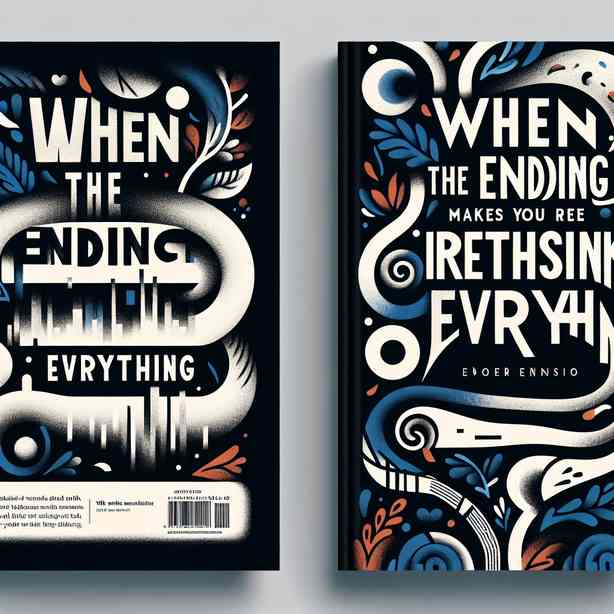
When the Ending Makes You Rethink Everything
In the realm of storytelling, whether it be literature, film, or even television series, endings hold a pivotal role that can redefine the entire narrative. A well-crafted ending not only concludes the plot but also offers new insights, encourages reflection, and can even teleport the audience back through the storyline with a fresh perspective. This intricate relationship between endings and storylines is something that has fascinated scholars, writers, and audiences alike for generations. The interplay of expectations and surprises can lead to profound revelations about the characters, their journeys, and ultimately, the themes that bind the narrative together.
The significance of an ending cannot be overstated. It is the moment where all threads tie together, where the conflicts are resolved, or in some cases, left tantalizingly open. Yet, a truly memorable ending is often one that incites a sense of reevaluation. Take, for instance, stories that flip the script, where what has been presented as the truth unfolds to reveal deeper layers of deception, sacrifice, or redemption. Such endings require the audience to think critically not just about the conclusion, but about everything that has transpired before, effectively reshaping their understanding of the entire narrative.
Consider the emotional investment that viewers or readers have in the characters and their arcs. A narrative may lead the audience down a series of compelling events, building a sense of anticipation until the culmination of events in the ending. If the conclusion aligns with what has been promised, it can elicit feelings of satisfaction and closure. However, when the ending diverges from expectations or introduces unforeseen elements, it can lead to a re-examination of character motivations and the underlying themes of the story.
For example, in many classic works, the endings serve as a critical commentary on society or human nature itself. Think of the endings of Shakespeare’s tragedies, where characters who seem to have full control over their destinies are brought down by their flaws or the irreversible nature of their decisions. Such endings do not merely serve to conclude a story; they challenge the audience to reflect on the nature of fate, ambition, and the human condition. What might appear as a failure or tragedy at first glance can turn into a profound lesson about life’s unpredictability when viewed through the lens of the entire narrative arc.
Moreover, endings can initiate conversations about moral ambiguity. Many popular narratives feature protagonists who are multifaceted, embodying both admirable traits and significant flaws. An ending that reveals the protagonist’s darker choices or the devastating consequences of their actions encourages a reexamination of their journey. Audiences might find themselves questioning not only the morality of the characters but also their own beliefs and judgments as they grapple with the complexities presented in these stories.
In the realm of film, the cult classic “Fight Club” exemplifies how a twist ending can transform the viewer’s perception of the entire narrative. With its revelation about the identity of the narrator, audiences are compelled to reconsider the seemingly random acts of violence and chaos throughout the film. Each scene that initially seemed disconnected gains new meaning and depth when reframed by the ending. This kind of storytelling challenges viewers to look beyond the surface, prompting them to engage with broader themes of consumerism, identity, and mental health.
Similarly, literature often employs ambiguous endings that leave readers pondering long after they turn the final page. Consider works like “The Catcher in the Rye” or “The Road”—both of which conclude with an air of uncertainty and open-ended possibilities. This deliberate choice forces readers to confront their interpretations and emotions, inviting diverse readings that may evolve over time. As a result, these endings can resonate differently depending on personal experiences and societal contexts, further emphasizing their profound impact.
Ultimately, the endings that cause us to rethink everything remind us of the power of storytelling as a vehicle for reflection and discourse. They serve as a mirror to our thoughts, beliefs, and experiences, allowing us to explore deeper truths about ourselves and the world around us. Endings that prompt introspection and discussion can bridge the gap between fiction and reality, showing us that narratives can shed light on complex issues in our lives.
The challenge for writers is to create that delicate balance where the ending feels earned yet surprising, where it honors the journey while compelling the audience to reconsider what they’ve experienced. This balance requires a deft understanding of both character and narrative arc; each moment must lead seamlessly to the conclusion while leaving the audience with lingering questions and reflections.
In conclusion, the magic of an ending lies in its ability to resonate beyond the confines of the narrative. It can evoke a spectrum of emotions—from grief to enlightenment, from confusion to clarity. When crafted skillfully, endings can surprise and confound, spark debates and discussions, and ultimately push us to reconsider not just the story presented, but the world we inhabit. As audiences engage with these tales, they embark on a journey of reflection, examining their beliefs and understanding in light of new revelations. Plenty of narratives have shown us the unexpected, and it is through these endings that we often find greater meaning tucked within the folds of storytelling. Whether a narrative leaves us with a sense of closure or lingering ambiguity, the way it shapes and influences our perspective is what makes the world of stories so remarkably profound.


